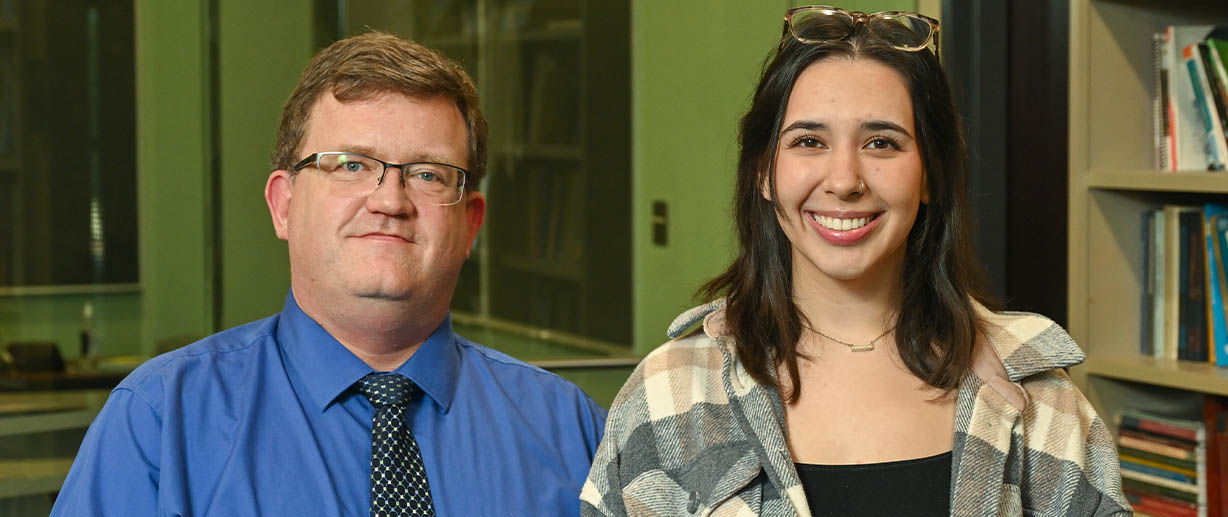Historians have long pondered the mysterious illness of England’s King George III. More popularly, “The Madness of King George,” a 1994 British film; the Netflix series “Bridgerton;” and “Hamilton,” the Broadway phenomenon, have kept the king who ruled Britain during the American Revolution in the mainstream. But the circumstances of his decline and death remain elusive.
“It’s really hard to diagnose when you don’t have access to the patient,” says Dr. Matt Cathey, professor of mathematics at Wofford. “Some historians have suggested porphyria, a hereditary blood defect. Others speculate bipolar disorder or diabetes … or a combination of these. I’m not sure anyone will ever know for sure.”
Cathey, however, may have stumbled across a more data-driven way to look at the journals of royal physicians that could shed new light on the mystery. He and Chanson Bullard ’26, a biology and psychology double major with a concentration in neuroscience from Sumter, S.C., spent the summer reviewing royal physician diaries and recording values for information logged, such as sleep, pulse, medicines administered, mood, bowel movements, exercise and much more. The database they developed has more than 100 categories.
“A committee of doctors was always in his presence, reporting back to the queen and Parliament,” says Cathey. “I realized when I was looking at the diaries — and there are more than 20 different volumes, each covering several months — this is all stuff that could be quantified.”
Cathey came to the realization while supporting the work of Dr. Carolyn Day, a professor of history at Furman University and his wife. He was making photographs of original manuscripts in the British Library.
Inspired by the archival work and the implications for looking at the documents through a more data-focused lens, Cathey returned to Wofford and proposed a faculty-led summer undergraduate research project.
“I applied for this research project because I found the topic interesting, especially as it combined my multidisciplinary interests in biology, psychology, history, philosophy and neuroscience,” says Bullard. She didn’t realize she would have to squint through thousands of pages of cursive notes, some more legible than others. Bullard did the heavy lifting when it came to transcribing, while Cathey took the lead on the programming and data analysis.
“Chanson brought the background in psychology that I’m missing,” says Cathey. “I have math, stats and data science down, but I’m less familiar with abnormal psychology.”
According to Bullard, reviewing the journals and finalizing the database will take years. She knows she likely won’t finish the project before she graduates in 2026, and there’s no guarantee that their work will lead to a diagnosis. Still, she can’t help but hypothesize potential explanations for his illness.
“I’m really interested in looking into a disorder of the limbic system — namely the basal ganglia, an area of high neuron cell body density, and the diencephalon, which contains the thalamus, hypothalamus and related structures,” says Bullard. “These structures affect everything: heart rate, blood pressure, metabolism, appetite, sleep patterns, incontinence. … He experienced deficits and irregularities in all these areas.”
Bullard and Cathey continue to work on building the database. It’s tedious and time-consuming, but both Bullard and Cathey are excited about the possibilities.
“It’s rewarding, and it could be a very valuable dataset,” says Bullard. “We’re doing something that will allow others to step in and apply their expertise.”
Cathey and Bullard have been invited to Oxford University to present their research at the British Society for Eighteenth-Century Studies’ annual conference in January. They will also participate in a roundtable discussion featuring scholarship from the United States, the United Kingdom and Canada.
“It’s important that we let this community of scholars know that this is something we’re working on. Not to plant a flag, but to present a proof of concept,” says Cathey, who is hoping to spend time in England introducing Bullard to the original documents in the British Library. “We’re both interested in discovering the questions that these Georgian historians have for us.”
